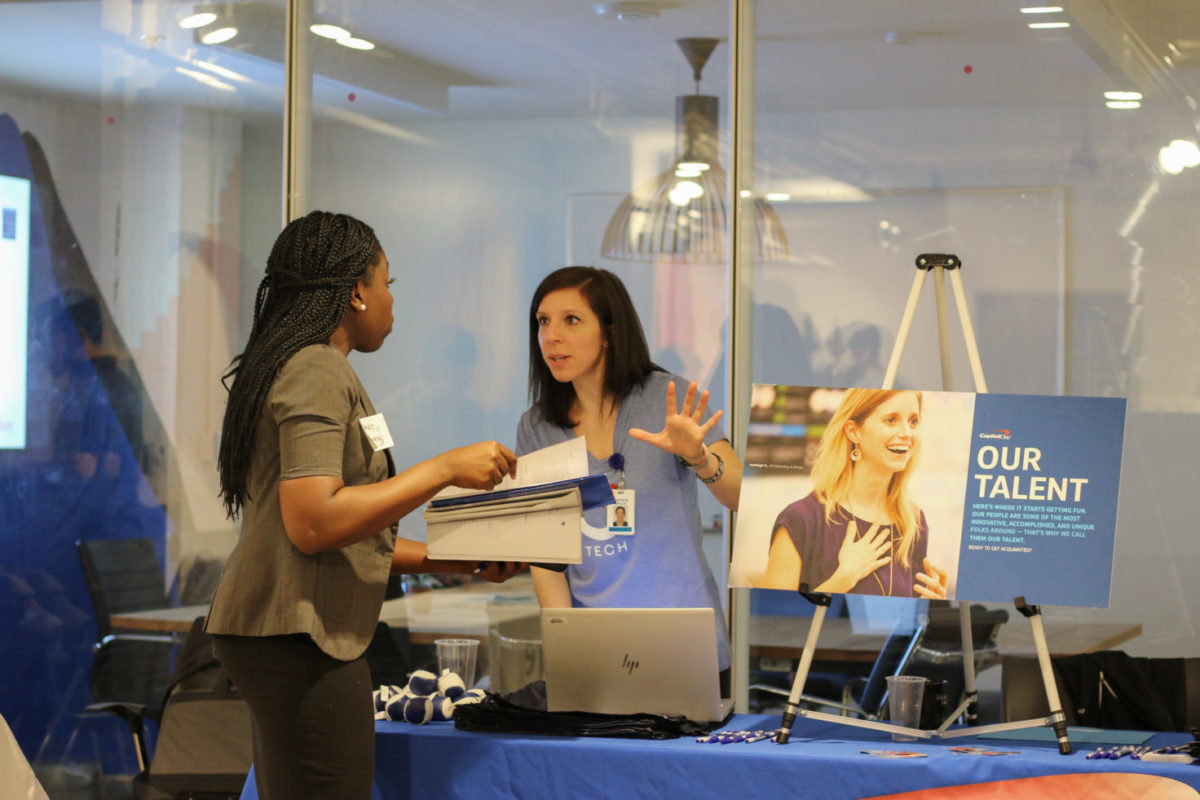Even though previous rankings and recent data shows that the District continues to be the number 1 place to be for women in tech, there’s got to be deeper reasons for this stat that go far beyond salary.
Women in tech in D.C. are in 38.9 percent of tech jobs in the area, according to data compiled by SmartAsset. Even though that stat may seem low, it’s better than most cities. To explore how local tech companies are putting strategies in place to retain women in tech roles, we gathered a group of women leading and working at local startups for Technical.ly DC’s most recent stakeholder meeting held in conjunction with NET/WORK DC last month. Here’s a look at what we heard about what these companies are doing to close the gender gap in tech:
Have your benefits package in order
Since Washington, D.C., has a new paid family leave law that will go into affect in 2020, this was definitely mentioned a lot when the question was posed: Does your company currently have a family leave policy?
When considering benefits packages, there’s no right time to get them secured, and the women at our stakeholder meeting attested to that. Amelia Friedman, cofounder of Hatch and now advisor to the company, said that the company didn’t start implementing family leave policies for mothers until Hatch’s VP of Marketing Selina McPherson announced she was expecting.
“It forced us to really think about a lot of things for the company since we hadn’t designed all of our polices,” Friedman said. “You start designing your family leave policies when you need them.”
Karen Gordon, VP of Growth for Goodshuffle, also emphasized that family leave is part of a bigger discussion at her company especially since during the hiring process, women and men candidates questioned the company about maternity and paternity leave. Gordon also talked about how as a small company, Goodshuffle built their benefits package based off the new law coming next year to stay ahead of the curve.
Diversify your hiring search
April Johnson, founder and CEO of Happied, shared that when the company was in search of a CTO, all of the initial candidates were men. She said it made her reconsider how she recruited the position, which was mainly from networking and not job board postings.
McPherson said Hatch’s team is 33% women, and explained how the company has taken on initiatives during the job search by reaching out to underrepresented groups to recruit them. Hatch recently used a text analysis tool to analyze their job descriptions for any phrases or terminology that could come off as biased. McPherson said the company did make changes based on their findings. From Hatch’s 12 employees, one third of the executive team is women and the full growth team is made up of women.
Kelly O’Malley, regional director for the Vinetta Project added that HR solutions companies are becoming more popular to help companies diversify their teams, starting with the hiring process.
Have coaches and champions on your team
All of the women agreed that mentorship plays an important role in their personal professional development. Gordon noted that she has had a lot of mentorship moments throughout her career. Even if they weren’t formal mentor relationships, they were still beneficial. Johnson said mentorship aided her professional development because she was inspired by seeing other women founders in this space.
“I think people define mentorship very differently,” McPherson said. “You’re enabling someone and providing them with something tangible they can do in order to develop leadership skills, or whatever skillset they want.”
McPherson talked about how it’s important for women to share opportunities with each other within their networks, whether that’s a speaking engagement or networking opportunity.
“I think that boils down to having women in leadership positions from the outset, and being able to build relationships with them, so that when there are those opportunities, you’re able to share them with other people within your team,” McPherson said.
What stuck with me the most is how Friedman explained the distinction between coaches and champions when it comes to mentorship: “Men tend to seek our champions and be champions, while women tend to seek out coaches and be coaches,” Friedman said.
The difference, she said, is that a coach will teach you while a champion will connect you and praise your work. Friedman said there’s a need for more women in tech seeking out champions and taking on that role for other women in the industry.
Before you go...
Please consider supporting Technical.ly to keep our independent journalism strong. Unlike most business-focused media outlets, we don’t have a paywall. Instead, we count on your personal and organizational support.
Join our growing Slack community
Join 5,000 tech professionals and entrepreneurs in our community Slack today!

The person charged in the UnitedHealthcare CEO shooting had a ton of tech connections

From rejection to innovation: How I built a tool to beat AI hiring algorithms at their own game

Where are the country’s most vibrant tech and startup communities?


